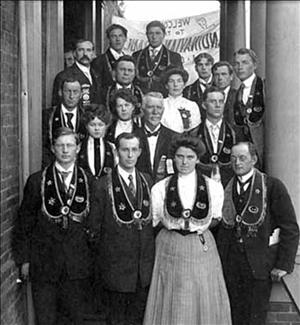On March 19, 1895, the Washington State Legislature unanimously passes a law prohibiting the sale of alcohol on the University of Washington campus in Seattle and within two miles of the campus, with the exception of the Madison Park business district, which lies just at the edge of the two-mile radius. The bill passes unanimously and without controversy. In 1906 the issue will come under consideration again when the Alaska-Yukon-Pacific (A-Y-P) Exposition Company begins searching for a site for the world's fair to be held in 1909. The campus would provide a spectacular site with ample room, but one with a prohibition on selling alcohol. At a different site, the A-Y-P Exposition Company would receive substantial income from alcohol concessions. The company will decide to use the campus, much to the chagrin of some, and the fair will nevertheless make a profit during its run in 1909. In 2009, the sale of alcohol on the university campus remains limited to special events, although today it is the UW Board of Regents, not the legislature, that determines the school's alcohol policy.
Evils of Drink
In the late nineteenth century, the temperance movement, which dated to the early 1800s, gained steam as leaders of the Progressive movement championed Prohibition laws. In Washington the Anti-Saloon League, the Woman's Christian Temperance Union, and the Independent Order of the Good Templars, along with other organizations, worked to gain an outright ban on the sale of alcohol. Unable to get a statewide ban enacted by the state legislature, temperance crusaders focused on more specific legislation, such as that pertaining to the University of Washington campus.
Albert Goddard (1863-1958), a Republican state representative from Seattle, belonged to the Independent Order of Good Templars. In his first term he introduced a bill banning the sale of alcohol at the University of Washington and within a two mile radius of the campus with the exclusion of the Madison Park business district from the ban. The bill passed without opposition and without controversy.
Washington's First World's Fair
In 1906, members of the Alaska-Yukon-Pacific Exposition Company began a site search for the world's fair they planned for 1909. They needed a site with plenty of room for exhibit buildings and a midway and it needed to be easily accessible from downtown Seattle. They considered Bailey Peninsula (now Seward Park), Magnolia, Mount Baker Park, Washington Park, and the University of Washington campus. The campus's advantages included its large, undeveloped southern portion, its accessibility from downtown Seattle by land and water, and the benefits the university would accrue from the fair's buildings and landscaping.
Choosing a site with a Prohibition on the sale of alcohol would mean the loss of a significant source of income, since the A-Y-P Exposition Company would receive a percentage of all concessions on the grounds. Additionally, they risked the ire of potential visitors disappointed by the lack of alcohol. The Patriarch, a Seattle newspaper, wrote a seething editorial in response to the choice of the dry campus for the fair, arguing:
"there will be thousands if not tens of thousands of visitors to the Exposition who have been using Puget Sound Beer in foreign markets for years, but they are confronted with the vainglorious spectacle when they reach here of being looked upon as 'crime-breeders' if they should expect to get a drink of wholesome beer at the home of its manufacture, unless he takes a street car jaunt of some five or six miles to get it" ("No Beer — No Subscription").
The fears proved groundless. The exposition made a profit even without the potential income from alcohol sales.
Beer After the Fair
In 1914, voters passed Initiative Measure Number 3, which prohibited alcohol in Washington (predating passage of federal Prohibition by three years). Although federal Prohibition was repealed in 1933, the 1895 law pertaining to the UW campus remained in effect. The legislature reduced the area encompassed in the ban to the area north of the Lake Washington Canal, south of East 52nd Street, east of 8th Avenue NE, and west of Lake Washington, roughly what is known as the University District today.
Some minor changes were made to the law in the ensuing years. In 1951, the legislature made the exception for, "any nationally recognized veterans' organization, which has maintained since December 31, 1932, a regularly chartered post off the campus of the university within the above described area, to conduct a cocktail lounge for members and guests during post functions" (1951 Wash. Laws, Ch. 120). This description matches just one organization, the American Legion Hall located at 911 E 50th (now NE 50th) Street. In 1975, the Faculty Club gained the ability to sell alcohol if it acquired a banquet permit.
In 2003, the state legislature repealed the 1895 law in its entirety and turned authority to make alcohol policy over to the Board of Regents, stating, "If an institution of higher education chooses to allow the sale of alcoholic beverages on campus, the legislature encourages the institution to feature products produced in the state of Washington" (2003 Wash. Laws, Ch. 51). The Regents have maintained the ban on the sale of alcohol, except for special events.

